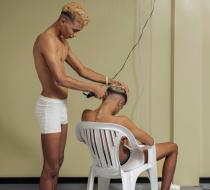Felipe Romero Beltrán captures young migrants coming-of-age in Seville Favorite
Horror stories about treacherous boat journeys from Africa to the Mediterranean far too often make headline news. The men, women and children fleeing their homes to start a new life in Europe become faceless numbers in the media, and are ‘othered’ by conservative politicians for their own agenda. What rarely gets attention, however, is the daily grind of young migrants living in limbo in refugee centres, coming-of-age and figuring out their identity as it relates to the country they’ve just arrived in and the one they’ve left behind. Colombian photographer Felipe Romero Beltrán hopes to capture this state of being in his new series “Dialect”, where staged images go beyond simple documentary reportage to give young migrants agency over the story of their arrival in Spain.
It’s the reason most of the boys, who are between the ages of 18 and 21, felt as though they had to leave their home. But there are other reasons as well. Homosexuality is illegal in the conservative Muslim country with jail sentences of up to three years, meaning the LGBTQ+ community must conceal their identities for fear of persecution and violence. A recent campaign of online harassment saw people making fake accounts on Grindr to out queer men in Morocco, exposing them to their families and, in some cases, forcing them onto the streets. Even in the migrant centre in Seville, where Aziz, Bilal, Isamael and Yousseff live, homophobia remains a dangerous reality, and is unlikely to be discussed among friends.
Despite differences between the boys, a boisterous camaraderie permeates Felipe’s images, revealing the strong bond formed between strangers sharing an intense experience. “We are like brothers, like a family,” Youssef says. “Everything you need, the group will help you.” For the most part, they arrived in Spain in early 2020 — the country was then one of the eurozone’s fastest growing economies — and quickly entered lockdown in a foreign place as the pandemic unfolded.
With the narrative surrounding migrants long politicised and discussed without the voices of migrants themselves, it was important for Felipe to let the boys craft their own self-image in his portraits. They are coming-of-age in a new country, “trying to figure out their own identity, especially with this shock and confrontation between the Spanish and the Moroccan identity,” the 28-year-old photographer says. They’re captured bleaching each other's hair, tensing their muscles for the camera, posing and play fighting, recreating moments and stories from previous days.
Felipe moved to Spain five years ago and started working on “Dialect” in June 2020. He’s visited the migrant centre in Seville nearly every day since then, often leaving his camera at the entrance and simply spending the day hanging out with the boys. He hopes his long term investment will help him create a more empathetic view of migrants than that of the mainstream media — which often dehumanises migrants and makes them invisible. Instead, Felipe’s portraits show the boys as they see themselves, and how they wish to be seen.









